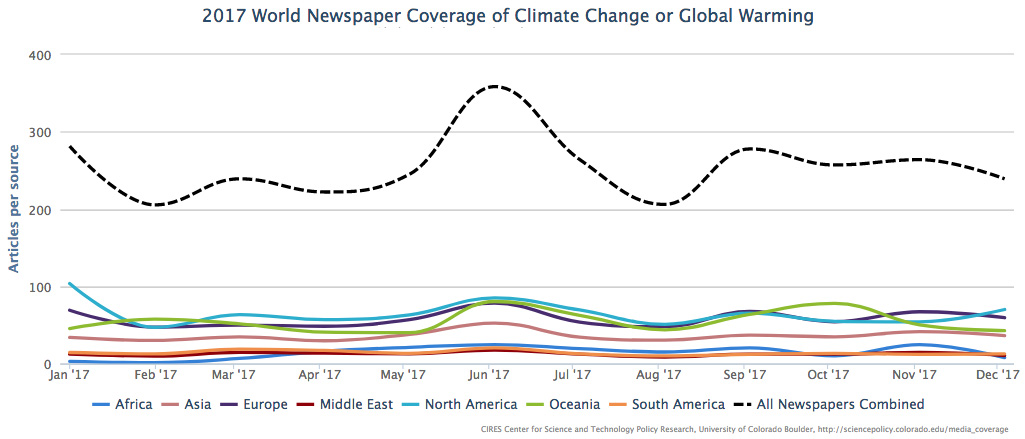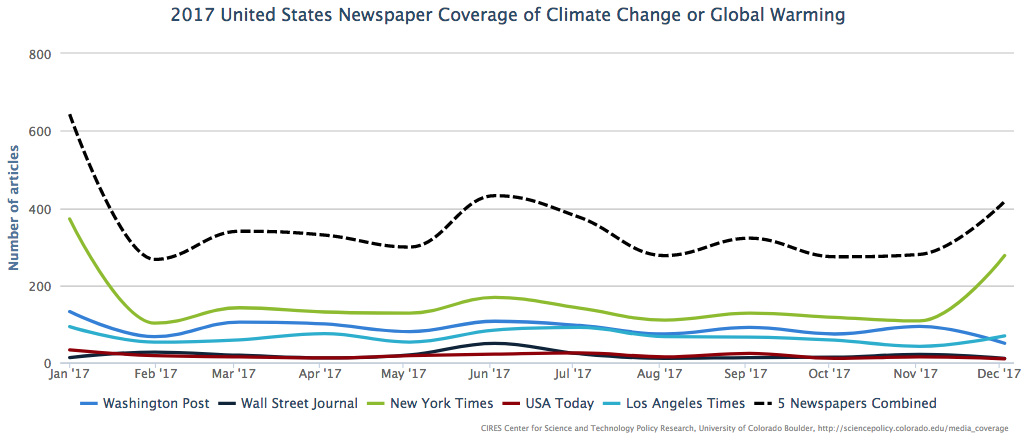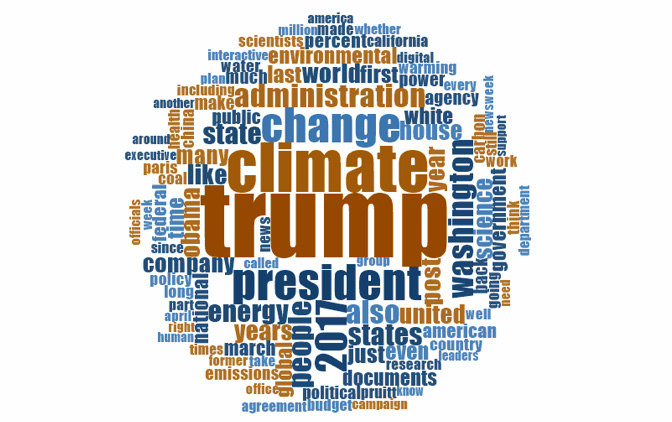MEDIA AND CLIMATE CHANGE OBSERVATORY MONTHLY SUMMARIES |
| The Media and Climate Change Observatory (MeCCO) analyzes traditional/legacy media representations of climate change. MeCCO team endeavors to comprehensively aggregate, monitor, appraise and critically examine media coverage that influence the spectrum of possibility for effective responses to ongoing climate challenges. The MeCCO team monitors 74 sources (across newspapers, radio and TV) in 38 countries in seven different regions around the world. |
Special Issue, 2017 Recap
|
 Figure 1. Media coverage of climate change or global warming in fifty-two sources across twenty-eight countries in seven different regions around the world, from January through December 2017. |
| However, coverage of climate change or global warming across The Washington Post, The Wall Street Journal, The New York Times, USA Today, and the Los Angeles Times in the US was at its highest level for the year in January. Figure 2 illustrates these trends month to month in US press accounts in these five publications in 2017. The inauguration of US President Trump on January 20th along with great anticipation (punctuated by a heavy dose of dread) regarding a new phase of approaches to science and the environment by the incoming administration generated numerous stories on political and policy dimensions of climate change. |
 Figure 2. Media coverage of climate change or global warming month to month in the Los Angeles Times, The New York Times, USA Today, The Washington Post, and The Wall Street Journal in the US from January through December 2017. |
The prominence of news on climate change or global warming associated with Donald J. Trump in 2017 has been referred to as a 'Trump Dump'. This is defined as a phenomena where media attention that would have focused on other climate-related events and issues instead was placed on Trump-related actions, leaving many other stories untold. This Trump Dump was illustrated most recently as the year 2017 came to an end, through media responses to the December 28 tweet from the President that referred to a cold snap in the Eastern half of the United States (approx. 1% of the Earth’s surface) to cheekily call into question investments and action to confront climate change (see Figure 3 for the tweet). This goading on social media garnered reports and responses in a number of sources. For examples, journalist Kendra Pierre-Louis from The New York Times reported that President Trump "appeared unaware of the distinction between weather and climate" in an article entitled 'It’s Cold Outside. Cue the Trump Global Warming Tweet'. Meanwhile, reporter Dino Grandoni from The Washington Post pointed out, "Before sending that message, Trump had not sent any tweet containing the phrase "climate change" or "global warming" since becoming president... In contrast, two years ago during the chilly winter of 2015, Trump sent off at least nine tweets holding up cold temperatures as evidence that global warming can't be happening." |
Figure 3. US President Donald J. Trump tweet from December 28, 2017 to close out the year. |
Throughout the year 2017, in terms of the frequency of words in articles in the US, 'Trump' was invoked 19,184 times through 4117 stories in The Washington Post, The Wall Street Journal, The New York Times, USA Today, and the Los Angeles Times in 2017 (a ratio of nearly 4.7 times per article on average). Figure 4 depicts word frequencies in US press accounts across the calendar year 2017.
|
This report is an aggregation of monthly summaries that our MeCCO team has compiled and posted each month on our website. The project is a part of the Center for Science and Technology Policy Research (CSTPR) in the Cooperative Institute for Research in Environmental Sciences (CIRES) at the University of Colorado Boulder. Initial funding for this project (six months) was received from the Office for Outreach and Engagement at the University of Colorado Boulder and continues with support from CSTPR. Media stories on climate change or global warming typically manifest through primary yet often intersecting political, scientific, cultural and ecological/meteorological themes. The month-to-month summaries that follow generally then highlight key events, stories and developments through these dimensions. As 2018 begins, it is a time for important reflection on how the past year 2017 shapes the one to come and those that follow. Reverend Martin Luther King, Jr. once said, "We are now faced with the fact that tomorrow is today. We are confronted with the fierce urgency of now." May this report provide a useful resource to help confront climate change in 2018 and beyond. Continue to read the full report here. - report prepared by Max Boykoff, Jennifer Katzung and Ami Nacu-Schmidt |


